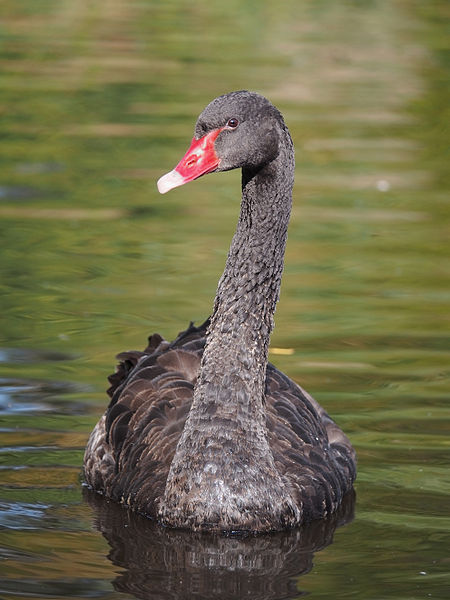 I'm am not an expert on Tchaikovsky's "Swan Lake," the ballet at the center of the Darren Aronofsky-directed thriller "Black Swan," (though I enjoy listening to it for relaxation). But I do know a thing or two about unpredictability after reading Nassim Nicholas Talem's "The Black Swan," a philosophy book about improbability and how to deal with it. The title comes from a Latin expression--more or less that a good man is as rare as a black swan (black swans were thought to have been non-existent). With the discovery of black swans in the seventeenth century, a millennium of thinking had instantly been erased. Moments of unpredictability--the outbreak of World War I, 9/11--present a "black swan problem."
I'm am not an expert on Tchaikovsky's "Swan Lake," the ballet at the center of the Darren Aronofsky-directed thriller "Black Swan," (though I enjoy listening to it for relaxation). But I do know a thing or two about unpredictability after reading Nassim Nicholas Talem's "The Black Swan," a philosophy book about improbability and how to deal with it. The title comes from a Latin expression--more or less that a good man is as rare as a black swan (black swans were thought to have been non-existent). With the discovery of black swans in the seventeenth century, a millennium of thinking had instantly been erased. Moments of unpredictability--the outbreak of World War I, 9/11--present a "black swan problem."There are characters here in Aronofsky's movie that participate in this game so that their desired outcome is achieved. However, its central player, performed by Natalie Portman, is one who is feeble and unable to do as the other characters do. But it's much more complicated than that--it appears she is going crazy.
Portman plays Nina, a young ballerina with a passion for perfection (a common theme in Aronofsky's films). She is determined to the point where some things do not seem quite right. Her director Thomas (Vincent Cassel) is demanding her to push harder to let herself go for the Black Swan part, to release her sexuality. Her mother (Barbara Hearshey) is overprotective, decorating her daughter's room with a painful amount of pink stuffed animals, and probably jealous of her daughter's success. What augments Nina's madness is that she now has a competitor named Lily (Mina Kunis). Lily has the easy ability to seduce which Nina lacks; it becomes evident to Nina that Lily is after her part, and the director is taking notice of the latter.
The movie will likely remind audience members of Roman Polanski's "Rosemary's Baby," particularly aspects such as sexuality, a strong female lead, creepiness, and the frightening presence of a scary man-bird. One disappointing aspect, however, is sometimes the dialogue is a bit (perhaps intentionally) silly. Thomas takes Nina back to his apartment one evening presumably to seduce her. He asks her questions: "Do you enjoy making love?" and she is noticeably embarrassed. "Sex," he says. "Do you like it?" She nervously giggles--the stuff of bad porn movies.
But this is one of the most stylish and gorgeous horror films in a while. There are moments that Aronofsky does not allow his camera to focus on, like spots of blood or muscles rotating or Nina being alone in the dark, but are still details that are impossible to ignore. (Personally, clipping nails and people standing straight up on their toes is difficult to watch, so this had better be sufficient preparation for "127 Hours.") In the first few moments, Aronofsky grabs your attention and refuses to relinquish it. He does this with the help of the music of "Swan Lake" as well as the original score by Clint Mansell, the cinematography of Matthew Libatique, and of course his performers. Natalie Portman gives the very best performance of her career so far, and as of this writing highly deserves the Academy Award. In "Black Swan" there is an expected amount of symbolism, a heavy amount of duality, and just the right amount of ambiguity. There are oft-used moments of people hiding in the dark and something arbitrarily jumping out to make us scared, but Aronofsky does not use these so they feel hackneyed. Instead, one gets the sense that this is an entirely original film.
I have never seen a bad film by Aronofsky, and I hope I never will. If one will exist, then the world is indeed unpredictable.
But this is one of the most stylish and gorgeous horror films in a while. There are moments that Aronofsky does not allow his camera to focus on, like spots of blood or muscles rotating or Nina being alone in the dark, but are still details that are impossible to ignore. (Personally, clipping nails and people standing straight up on their toes is difficult to watch, so this had better be sufficient preparation for "127 Hours.") In the first few moments, Aronofsky grabs your attention and refuses to relinquish it. He does this with the help of the music of "Swan Lake" as well as the original score by Clint Mansell, the cinematography of Matthew Libatique, and of course his performers. Natalie Portman gives the very best performance of her career so far, and as of this writing highly deserves the Academy Award. In "Black Swan" there is an expected amount of symbolism, a heavy amount of duality, and just the right amount of ambiguity. There are oft-used moments of people hiding in the dark and something arbitrarily jumping out to make us scared, but Aronofsky does not use these so they feel hackneyed. Instead, one gets the sense that this is an entirely original film.
I have never seen a bad film by Aronofsky, and I hope I never will. If one will exist, then the world is indeed unpredictable.















0 comments:
Post a Comment